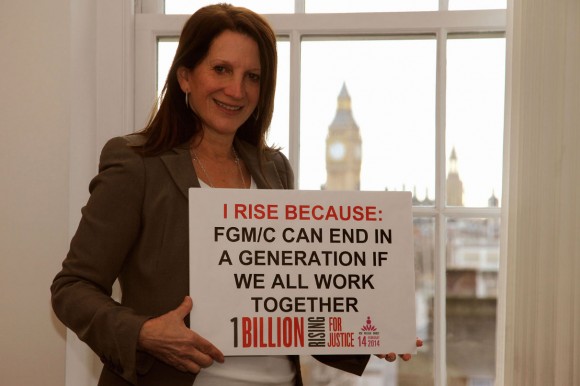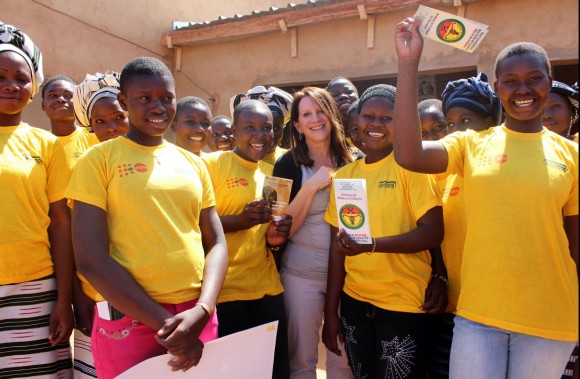I wanted to take the opportunity of V-Day, a day on which girls and women around the world will rise up to challenge the violence perpetrated on them, to update you on my priorities as Ministerial Champion for the elimination of violence against women and girls overseas for the year.
Violence against girls and women is 1 of the most systematic, widespread human rights abuses in the world. One in 3 women will experience it in their lifetimes. The UK government believes this can change, that every woman and girl has the right to live free from violence and abuse.
We cannot simply accept violence against girls and women as inevitable. To do so is to waste the potential of generations: girls and women who have to live with the consequences of violence such as being locked out of education or health services, unable to take up employment opportunities or to participate in decision-making.
Investing in girls and women is the smart thing to do, as well as the right thing to do. We are working to give girls and women voice, choice and control – including control over their own bodies – to tackle this pandemic of violence.

I am proud to say, as Ministerial Champion for tacking violence against women and girls, that the UK government has shown considerable leadership in this area at all levels. This includes driving change throughout the humanitarian system to ensure that girls and women are protected from violence during an emergency; leading the way on tackling sexual violence in conflict through the Foreign Secretary’s Preventing Sexual Violence Initiative; supporting a flagship programme on female genital mutilation/cutting (FGM/C) aimed at ending the practice in priority countries within a generation; and investing in evidence of what works to prevent violence against women and girls in the first place.
This year will be no different. In 2014 the Prime Minister is championing efforts to improve the lives of girls and women, both at home and through our international work. This is a cross-government effort, addressing a range of challenging issues which affect girls and women such as female genital mutilation/cutting, early and forced marriage, family planning, and gender-based violence in conflict, where women and girls are disproportionately affected. Our engagement should result in a better future for girls and women where they are able to live lives free from violence and fulfil their potential, in the UK and overseas.

My priorities for this year include:
- Defending/securing the rights of girls and women to live free from violence, through international negotiations such as the Commission on the Status of Women in March and the ongoing negotiations on the framework which will take us beyond the Millennium Development Goals (MDGs).
- Eliminating FGM/C within a generation. There are at least 125 million women worldwide who have been subject to FGM/C. In countries like Egypt and Somalia, more than 90% of girls and women have been cut. Here in the UK thousands of girls face being sent abroad in the ‘cutting season’ of the long summer holiday. The UK government is working to end this practice within a generation in 17 countries through our flagship programme that includes: targeted community-level programming to support social norms change and support enabling policies and legislation; a social change campaign to galvanise a movement to end the practice at local, national and international level; and research to build a robust evidence base on what works to end the practice. This programming will complement work already going on in the UK to eliminate the practice here.
- Sharing what we know works to prevent violence against girls and women, by investing in research and working with others to ensure what we do is based on strong evidence.
- Forging strategic partnerships in the international system to ‘lock in’ prevention of violence against girls and women, making sure we get the best outcomes for girls and women by working closely with others over the long term.
- Linking our international work with the domestic, particularly our work on FGM/C and Early and Forced Marriage where there is significant read-across, and through the UK’s National Action Plan on violence against women and girls.
All of this work complements the considerable work going on across government to tackle violence against women and girls in the UK. I hope that colleagues will be able to take opportunities to update their constituents on some of this important work the government is taking forward and which we can rightly be proud of.
Find out more about V Day and ways to get involved in the One Billion Rising movement.
Keep in touch. Sign up for email updates from this blog, or follow Lynne on Twitter.

Recent Comments